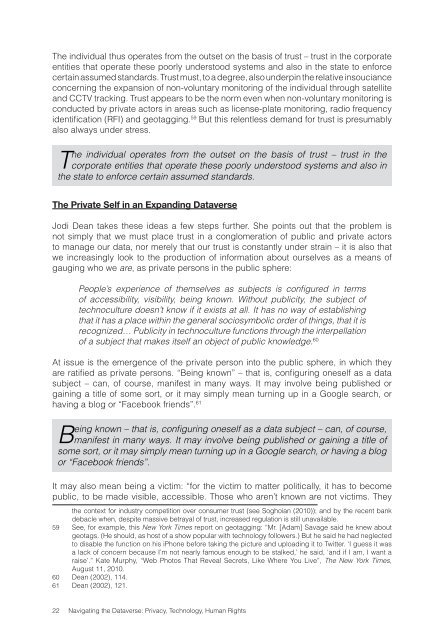Navigating the Dataverse: Privacy, Technology ... - The ICHRP
Navigating the Dataverse: Privacy, Technology ... - The ICHRP
Navigating the Dataverse: Privacy, Technology ... - The ICHRP
Create successful ePaper yourself
Turn your PDF publications into a flip-book with our unique Google optimized e-Paper software.
<strong>The</strong> individual thus operates from <strong>the</strong> outset on <strong>the</strong> basis of trust – trust in <strong>the</strong> corporate<br />
entities that operate <strong>the</strong>se poorly understood systems and also in <strong>the</strong> state to enforce<br />
certain assumed standards. Trust must, to a degree, also underpin <strong>the</strong> relative insouciance<br />
concerning <strong>the</strong> expansion of non-voluntary monitoring of <strong>the</strong> individual through satellite<br />
and CCTV tracking. Trust appears to be <strong>the</strong> norm even when non-voluntary monitoring is<br />
conducted by private actors in areas such as license-plate monitoring, radio frequency<br />
identification (RFI) and geotagging. 59 But this relentless demand for trust is presumably<br />
also always under stress.<br />
<strong>The</strong> individual operates from <strong>the</strong> outset on <strong>the</strong> basis of trust – trust in <strong>the</strong><br />
corporate entities that operate <strong>the</strong>se poorly understood systems and also in<br />
<strong>the</strong> state to enforce certain assumed standards.<br />
<strong>The</strong> Private Self in an Expanding <strong>Dataverse</strong><br />
Jodi Dean takes <strong>the</strong>se ideas a few steps fur<strong>the</strong>r. She points out that <strong>the</strong> problem is<br />
not simply that we must place trust in a conglomeration of public and private actors<br />
to manage our data, nor merely that our trust is constantly under strain – it is also that<br />
we increasingly look to <strong>the</strong> production of information about ourselves as a means of<br />
gauging who we are, as private persons in <strong>the</strong> public sphere:<br />
People’s experience of <strong>the</strong>mselves as subjects is configured in terms<br />
of accessibility, visibility, being known. Without publicity, <strong>the</strong> subject of<br />
technoculture doesn’t know if it exists at all. It has no way of establishing<br />
that it has a place within <strong>the</strong> general sociosymbolic order of things, that it is<br />
recognized… Publicity in technoculture functions through <strong>the</strong> interpellation<br />
of a subject that makes itself an object of public knowledge. 60<br />
At issue is <strong>the</strong> emergence of <strong>the</strong> private person into <strong>the</strong> public sphere, in which <strong>the</strong>y<br />
are ratified as private persons. “Being known” – that is, configuring oneself as a data<br />
subject – can, of course, manifest in many ways. It may involve being published or<br />
gaining a title of some sort, or it may simply mean turning up in a Google search, or<br />
having a blog or “Facebook friends”. 61<br />
Being known – that is, configuring oneself as a data subject – can, of course,<br />
manifest in many ways. It may involve being published or gaining a title of<br />
some sort, or it may simply mean turning up in a Google search, or having a blog<br />
or “Facebook friends”.<br />
It may also mean being a victim: “for <strong>the</strong> victim to matter politically, it has to become<br />
public, to be made visible, accessible. Those who aren’t known are not victims. <strong>The</strong>y<br />
<strong>the</strong> context for industry competition over consumer trust (see Soghoian (2010)); and by <strong>the</strong> recent bank<br />
debacle when, despite massive betrayal of trust, increased regulation is still unavailable.<br />
59 See, for example, this New York Times report on geotagging: “Mr. [Adam] Savage said he knew about<br />
geotags. (He should, as host of a show popular with technology followers.) But he said he had neglected<br />
to disable <strong>the</strong> function on his iPhone before taking <strong>the</strong> picture and uploading it to Twitter. ‘I guess it was<br />
a lack of concern because I’m not nearly famous enough to be stalked,’ he said, ‘and if I am, I want a<br />
raise’.” Kate Murphy, “Web Photos That Reveal Secrets, Like Where You Live”, <strong>The</strong> New York Times,<br />
August 11, 2010.<br />
60 Dean (2002), 114.<br />
61 Dean (2002), 121.<br />
22 <strong>Navigating</strong> <strong>the</strong> <strong>Dataverse</strong>: <strong>Privacy</strong>, <strong>Technology</strong>, Human Rights
















